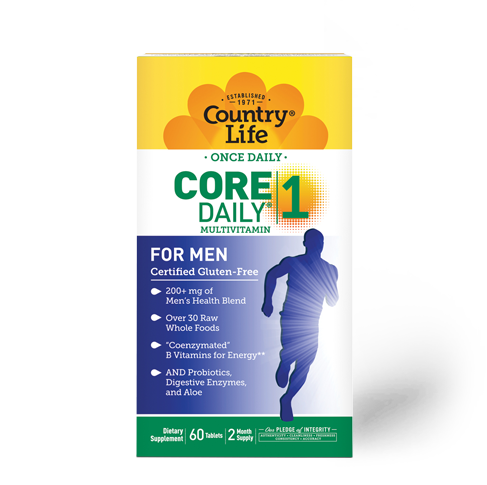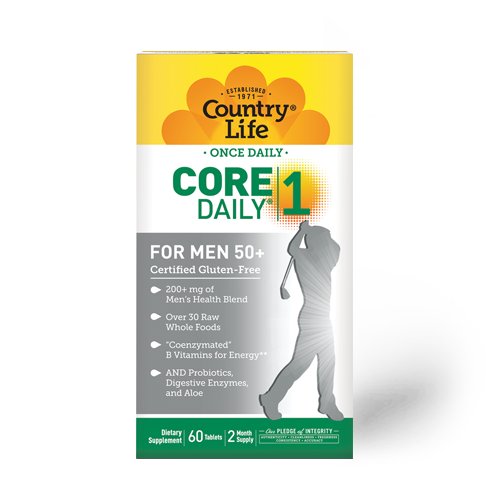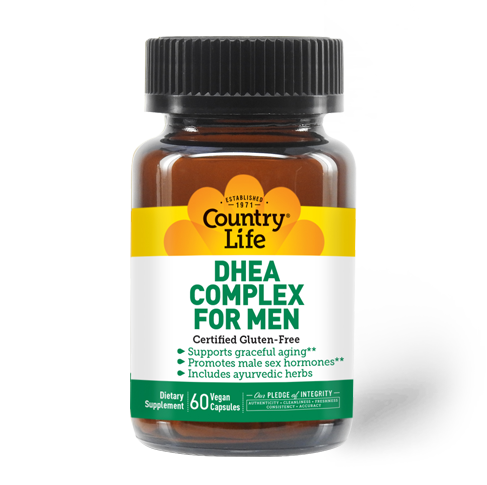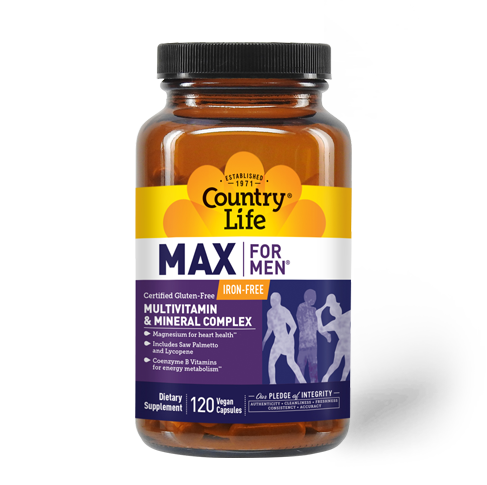In Part 1 of our best supplements for men series, we focused on five lesser-known nutrients that support immunity, prostate function, sleep, cardiovascular function, and a healthy stress response.
In Part Two, we’re expanding our scope to include targeted, evidence-based supplementation for longevity, muscle building, graceful aging, and cardiovascular function, suitable for men of all ages and abilities.
Why do Men Need Specific Supplements?
The supplements you’re about to discover aren’t exclusively beneficial to men, and not all men need the same supplements—if any.
Whole, real foods are your best source of nutrients. Period.
However, certain supplements can help fill nutritional gaps (men generally have higher nutrient demands), optimize nutrient levels, and support your health and fitness goals.
The best way to establish a targeted supplement routine is to talk to your healthcare practitioner, who can recommend specific nutrient tests and assess your individual needs.
This article serves as a starting point, providing helpful information on supplements that may be particularly beneficial to men at various stages of life.
Five More of the Best Supplements for Men
These supplements are designed to support health and fitness goals common to men, including muscle building, cardiovascular function, sexual function, longevity, and overall well-being.
You’ll also find tips on how to find the highest quality supplements, the best forms, and starting points for dosing to discuss with your healthcare practitioner.
1. Creatine Monohydrate
Creatine is one of the most extensively studied dietary supplements for men to support energy, exercise performance, facilitate recovery, and promote muscle growth.
What is Creatine?
Creatine is a naturally occurring compound made from the amino acids arginine, glycine, and methionine.
It’s found in certain protein-rich foods, like meats and seafood, and made by the body, where it’s primarily stored in muscle.
Creatine does lots of things for us, including creating energy from ATP (the cell’s energy powerhouse), which helps boost energy during exercise, build muscle, support recovery, and more.[1]
Creatine is also available as a supplement and is used primarily to boost exercise performance,
Creatine Benefits for Men
Creatine offers a variety of studied benefits for men, including supporting:[1][2]
- Energy
- Exercise performance
- Post-workout recovery
- Muscle building and definition, when combined with strength training (creatine draws water into the muscles, making them appear more defined)
- Cognitive function
- Optimal body composition
- Muscle endurance
- Metabolic function
- Skin health
How Much Creatine do You Need?
General recommendations for creatine supplementation range from 3-5 grams per day for maintenance, and 20-25 grams per day for the initial loading phase, which lasts five to seven days.
The loading phase is designed to saturate the muscles, which may help produce faster results and noticeable benefits.
Talk to your healthcare practitioner about the best dose for you.
Note, people with kidney disease must talk to their doctors before using creatine, as studies suggest it may be contraindicated for damaged kidneys.
The Best Creatine Supplements for Men
Creatine Monohydrate is the most extensively studied form of creatine and is considered the gold standard for supplementation.
When searching for a creatine monohydrate supplement, ensure it’s free from additives, preservatives, and unnecessary ingredients.
Country Life Vitamins’ sister company, Biochem, offers clean and authentic Creatine Monohydrate that’s free from artificial colors, flavors, sweeteners, and preservatives, and is keto- and vegan-friendly, as well as micronized for easy mixing.
One teaspoon contains 5 grams of creatine monohydrate.
Shop Biochem Creatine Monohydrate
2. Vitamin D for Men
Vitamin D supplementation isn’t just recommended for men, but it’s an important nutrient to monitor at your annual check-ups.
What is Vitamin D?
Vitamin D is, obviously, a vitamin, but it’s also a hormone precursor; a type of substance needed for the production of hormones.
It is also unique in that its primary source isn’t food but the sunshine—hence its nickname “the sunshine vitamin”.
Vitamin D Benefits for Men
Vitamin D supplementation is highly recommended for all genders, as studies have shown that approximately 50% of the global population is deficient.[3][4]
As you may have guessed, researchers believe that much of this is due to modern indoor lifestyles, which shield people from their most potent source of vitamin D, the sun.
As an essential vitamin and hormone precursor, vitamin D offers many benefits for men, including supporting: [5-9]
- Bone structure
- Various aspects of cardiovascular function
- Cognitive function and mental/emotional health
- Endocrine (hormonal) function
- Gastrointestinal, digestive, and microbiome function
- Genetic expression
- Immune function
- Kidney function
- Nervous system function
- Reproductive function in all genders
- Skin health
With numerous health implications, it’s easy to see why vitamin D screening and supplementation have become the norm in most healthcare practices.
The Best Form of Vitamin D for Men
Research suggests vitamin D3 is the most bioavailable (absorbable) form, versus vitamin D2.[11]
Emerging studies also suggest that combining vitamin D3 and vitamin K2 may offer synergistic benefits for bone function, as vitamin D3 helps free up calcium, while vitamin K2 ensures it’s deposited into the bones versus other soft tissues.[12]
Country Life offers bioavailable natural vitamin D3 derived from lanolin (a sustainable, non-fish liver source) or lichen (a vegan option), available as a stand-alone supplement or combined with vitamin K2 or other nutrients.
Some of our best-selling vitamin D3 supplements include:
- Vitamin D3, in 1,000 IU, 2,500 IU, 5,000 IU, and 10,000 IU
- Vitamin D3 K2
- Vitamin D3 Gummies
- Vegan D3 Softgels (from lichen)
- Vegan Vitamin D3 Spray (from lichen)
- Calcium Magnesium with Vitamin D3
Our men’s multivitamins also contain vitamin D3, although your healthcare practitioner may recommend additional supplementation.
Talk to your healthcare practitioner and see Is It a Vitamin D Deficiency? Learn The Signs & Symptoms for more information on optimizing vitamin D levels.
3. Whey or Plant Protein Powder
Protein powders are a favorite among active, fitness-oriented men for supporting muscle growth, recovery, metabolic function, and meeting protein targets.
However, the popularity of protein powders has led to an influx of supplements, many of which vary widely in quality and ingredients.
Many men are also unsure of the best form of protein powder to meet their needs.
Here, we’ll discuss the benefits and merits of whey versus plant protein, and how to ensure you’re getting a quality, junk-free supplement.
Whey Vs. Plant Protein: Which Is Best For Men?
Whey and plant protein powders can both offer high-quality, easily absorbable protein to help you meet your health and fitness goals.
The best form for you depends on three key factors, including:
- Your dietary philosophy (animal or plant-based)
- Your digestion (not everyone digests whey or plant protein the same)
- Your specific health goals, as one form may be more studied for certain circumstances than another
Let’s unpack this further by examining the benefits and drawbacks of whey vs. plant protein.
Benefits of Whey Protein for Men
Whey protein is highly nutritious and one of the more studied forms of protein powders, with research suggesting it can support:[12-20]
- Exercise recovery
- Gut health
- Muscle building
- Satiety
- Body composition
- Normal appetite
- Metabolic function
Whey protein powders also typically have a pleasant, neutral flavor, provide all essential amino acids, and provide 20-30 grams of protein per serving.
As a bonus, whey protein isolate (versus concentrate) contains very little lactose, making it typically appropriate for those with dairy or lactose sensitivities.
Whey protein isolate also has more protein per gram and less fat than concentrate.
Potential Drawbacks of Whey
Whey protein has many benefits, but it’s not for everyone.
For example, some people with dairy or lactose sensitivities do not tolerate whey protein concentrate, or even whey isolate, on occasion.
It’s also a milk-based product, making it unsuitable for vegans.
Most whey protein powders are sourced from conventional dairy products, which aren’t organic and may not employ optimal animal welfare practices.
Finally, tests have shown that some brands of whey protein contain other forms of animal protein, making it essential for vegetarians to choose third-party certified vegetarian whey protein.
Related reading: What’s the Difference Between Whey Protein: Isolate Vs. Hydrolysate Vs. Concentrate?
The Benefits of Plant Protein for Men
Plant proteins used to be considered inferior to whey protein because of their incomplete amino acid profile (missing essential amino acids, the building blocks of protein), reliance on soy-based protein, and/or chalky flavor and texture.
However, new advances in plant protein formulation have created a whole new generation of soy-free plant protein blends designed to taste great, be ultra-nutritious, and contain all essential amino acids.
The best plant proteins typically combine several sources of plant protein, such as pea, cranberry seed, hemp, or rice, to create a complete protein rich in nutrients that's also easy to digest.
Plant protein powders also typically contain gut- and heart-friendly fiber, which may be lacking from animal-based protein powders.
Potential Drawbacks of Plant Protein
Plant protein powders have come a long way in the last decade and provide comparable benefits to whey and other forms of protein.
However, some people may prefer whey or other forms of protein due to potential drawbacks, including:
- Flavor and mouthfeel: Not all plant proteins are equal in terms of texture and flavor
- Nutrients: Whey protein typically contains higher amounts of specific amino acids, like leucine, that may be important for those looking to build muscle
- Amino acid profile: High-quality plant protein powders should contain a complete amino acid profile, but not all do
- Digestibility: Some people digest whey or other forms of protein better than plant proteins
- Less research: Whey protein has a long history of use, and is therefore more researched than most plant proteins and isolates
Related reading: How To Read A Protein Powder Nutrition Label
The Bottom Line + Tips for Choosing the Best Protein Powder
The best protein powder for you depends on your nutritional philosophy, digestion, personal preferences, and health goals.
Here are some tips on choosing high-quality whey protein:
- Look for whey isolate versus concentrate, for easier digestibility, more protein, and less lactose and fat
- Choose whey sourced from grass-fed cows, for more nutrients and lower environmental impact (plus, happier, healthier cows!)
- Avoid artificial colors, flavors, additives, and preservatives
- Look for whey protein powders with a short ingredient list
- Choose brands that offer 20-30 grams of protein per serving
- Look for naturally sweetened or unsweetened brands free from refined sugar and artificial sweeteners
- Ensure the brand tests for purity, identity, and integrity of raw materials and finished product (unsure? Just ask!)
- Look for Certified Vegetarian Whey
- If you’re gluten-free or gluten-sensitive, look for Certified Gluten-Free brands
Tips for choosing high-quality plant protein:
- Look for brands that include organic, sustainably sourced ingredients
- Choose plant proteins with a complete amino acid profile
- Avoid or limit rice protein, as it’s at a higher risk of arsenic contamination.[21] If you want to use rice protein, ask the manufacturer about their heavy metal testing methods and specs
- Look for brands that are DNA-verified vegan (yup, animal products have been detected in some plant proteins)
- Avoid artificial colors, flavors, additives, and preservatives
- Look for naturally sweetened or unsweetened brands free from refined sugar and artificial sweeteners
- Ensure the brand tests for purity, identity, and integrity of raw materials and finished product (unsure? Just ask the company, they should be happy to help)
- If you’re gluten-free or gluten-sensitive, look for Certified Gluten-Free brands
Our sister company, Biochem, offers a variety of clean, vegetarian-certified, and certified gluten-free grass-fed Whey Protein Isolate, as well as vegan-verified, naturally sweetened, and sustainably sourced 100% Vegan Protein Powders Made from pea, hemp, and cranberry seeds.
All Biochem’s protein powders are tested for purity, identity, and integrity and are free from artificial flavors, colors, preservatives, and additives.
Plus, they taste great!
4. DHEA
DHEA supplements are popular among men over fifty or those seeking support for energy, endurance, hormonal, or sexual function.
What is DHEA?
DHEA or dihydroepiandrosterone is a type of steroid hormone required for the production of male and female sex and reproductive hormones, including testosterone, estradiol, and progesterone.
The body produces DHEA in the adrenal glands, but its production naturally wanes with age or may be affected by other factors related to health, environment, and lifestyle.
How DHEA Benefits Men
Since DHEA is essential for normal hormonal function, supplementation may be recommended for men to support
- Normal DHEA levels
- Muscle strength
- Hormonal function
- Sexual function
- Cardiovascular function
- Skin health
- Metabolic function
- Body composition
- Bone structure
It’s important to note that studies on DHEA supplementation in men are mixed, with some suggesting clear benefits and others indicating mixed or no benefits.
This suggests DHEA supplementation is not a one-size-fits-all solution and should be discussed with a healthcare practitioner specializing in men’s hormonal health.
The Best DHEA Supplements for Men
Talk to your doctor or healthcare practitioner before beginning a DHEA supplement as they can recommend optimal dosing.
If you decide to supplement, consider Country Life Vitamins DHEA Complex for Men with 50 mg of DHEA and supportive herbs like Moomiyo Extract (Shilijit) and Puncture Vine Extract.
We also offer pure DHEA in 25 mg and 10 mg capsules, as well as a DHEA Complex for Women.
5: CoQ10
CoQ10 is naturally made within the body, but like DHEA, its levels naturally decline with age or due to other health, environmental, or lifestyle factors.
What is CoQ10?
CoQ10, also known as ubiquinol or ubiquinone, is a fat-soluble antioxidant made mainly within the body. It is also found in foods such as meat, seafood, eggs, nuts, whole grains, and oils, as well as various supplements.
CoQ10 plays a crucial role in various biological functions, including the conversion of nutrients into energy within the mitochondria (the cell’s energy powerhouse), cardiovascular function, cognitive function, metabolic function, inflammatory response, and muscular function.
CoQ10 Benefits for Men
CoQ10 has been widely studied, with research suggesting supplementation may support various aspects of health, including:[26-32]
- Antioxidant levels
- Cardiovascular function
- Cellular health
- Collagen production and skin health
- Energy levels
- Exercise recovery and performance
- Inflammatory response
- Metabolic function
- Neurological function
- Reproductive function
Related reading: What’s The Difference Between Ubiquinol And CoQ10?
The Best CoQ10 Supplements for Men
Since CoQ10 is a fat-soluble antioxidant, the best supplements pair CoQ10 (either ubiquinol or ubiquinone) with a healthy fat, such as vitamin E, for optimal absorption.
Country Life Vitamins offers two CoQ10 options:
- MaxiSorb Mega CoQ10, made with 100 mg of Kaneka® Ubiquinone, one of the most-studied and absorbable forms of CoQ10 in a base of medium-chain triglycerides (MCT).
- Vegan CoQ10: A vegan version with the same high-absorbable ubiquinone in a vegan soft gel. Available in 60 mg - 200 mg capsules.
Let’s Recap These Five Best Supplements for Men
We’ve covered a lot about nutritional supplements for men, so here’s a quick recap and easy reference list.
Creatine Monohydrate
Vitamin D3
- Vitamin D3, in 1,000 IU, 2,500 IU, 5,000 IU, and 10,000 IU
- Vitamin D3 K2
- Vitamin D3 Gummies
- Vegan D3 Softgels (from lichen)
- Vegan Vitamin D3 Spray (from lichen)
- Calcium Magnesium with Vitamin D3
Whey and Plant Protein Powder
DHEA
CoQ10
Looking for more information on supplements for men? Check out: 5 Recommended Supplements For Men.
Why Trust Country Life Vitamins?
All Country Life Vitamins supplements are purity tested, from raw ingredients to finished supplements, to ensure they are free from harmful contaminants and have accurate potency.
The same is true for our sister sports nutrition brand, Biochem, makers of the Creatine Monohydrate, grass-fed whey, and sustainably sourced vegan protein powders you just learned about, as well as BCAA, Glutamine, and Natural Testosterone Booster.
References:
- “Creatine in Health and Disease”. Nutrients.
- “Creatine supplementation nullifies the adverse effect of endurance exercise on the subsequent strength performance”. Rodrigo Vitasovic Gomes1 and Marcelo Saldanha Aoki1,2.
- Vitamin D deficiency 2.0: An update on the current status worldwide”. European Journal of Clinical Nutrition.
- “Vitamin D deficiency in the US population”, 2001-2018. Front Nutr.
- “Vitamin D: An Evidence-Based Review”. The Journal of the American Board of Family Medicine.
- Cardiovascular benefits of vitamin D. Sheng Li Xue Bao. 2014 Feb 25;66(1):30-6. PMID: 24553867
- “The implication of vitamin D and autoimmunity: a comprehensive review”. Clin Rev Allergy Immunol.
- “Influence of vitamin D status and vitamin D3 supplementation on genome wide expression of white blood cells: a randomized double-blind clinical trial”. PLoS One.
- “Vitamin D and the central nervous system”. Pharmacol Rep.
- “Effects of High-Dose Vitamin D2 Versus D3 on Total and Free 25-Hydroxyvitamin D and Markers of Calcium Balance”. J Clin Endocrinol Metab.
- “The combination effect of vitamin K and vitamin D on human bone quality: a meta-analysis of randomized controlled trials”. Food Funct.
- “Whey Protein Supplementation Enhances Whole Body Protein Metabolism and Performance Recovery after Resistance Exercise: A Double-Blind Crossover Study”. Nutrients.
- “Nutritional interventions to augment resistance training-induced skeletal muscle hypertrophy”. Frontiers in Physiology.
- “Effects of whey protein supplementation prior to, and following, resistance exercise on body composition and training responses: A randomized double-blind placebo-controlled study”. Journal of Exercise Nutrition & Biochemistry.
- “Impact of Whey Protein Supplementation in a Weight-Loss Intervention in Rural Dwelling Adults: A Feasibility Study”. Clinical Nutrition ESPEN.
- “Effect of milk protein intake and casein-to-whey ratio in breakfast meals on postprandial glucose, satiety ratings, and subsequent meal intake”. J Dairy Sci.
- “Whey protein supplementation and muscle mass: current perspectives”. Nutrition and Dietary Supplements.
- “Whey protein concentrates with and without immunoglobulins: a review” J Med Food.
- “Ingestion of a protein hydrolysate is accompanied by an accelerated in vivo digestion and absorption rate”. Journal of Nutrition.
- “Supplementation with a whey protein hydrolysate enhances recovery of muscle force-generating capacity following eccentric exercise”. J Sci Med Sport.
- “Rice Intake and Emerging Concerns on Arsenic in Rice: a Review of the Human Evidence and Methodologic Challenges”. Curr Environ Health Rep.
- “The effect of six months treatment with a 100 mg daily dose of dehydroepiandrosterone (DHEA) on circulating sex steroids, body composition and muscle strength in age-advanced men and women”. Clin Endocrinol (Oxf).
- “Dehydroepiandrosterone (DHEA): hypes and hopes”. Drugs.
- “Dehydroepiandrosterone supplementation in elderly men: a meta-analysis study of placebo-controlled trials”. J Clin Endocrinol Metab.
- “Dehydroepiandrosterone Supplementation Improves Endothelial Function and Insulin Sensitivity in Men”. The Journal of Clinical Endocrinology & Metabolism.
- “Disorders of Human Coenzyme Q10 Metabolism: An Overview”. International Journal of Molecular Sciences.
- “Disorders of Human Coenzyme Q10 Metabolism: An Overview”. Int J Mol Sci.
- “Coenzyme Q10 and Autoimmune Disorders: An Overview”. Int J Mol Sci. 2024 Apr
- “Role of Coenzyme Q10 in Health and Disease: An Update on the Last 10 Years (2010–2020)”. Antioxidants.
- “Coenzyme Q10: Clinical Applications beyond Cardiovascular Diseases”. Nutrients.
- “Comparison of Coenzyme Q10 (Ubiquinone) and Reduced Coenzyme Q10 (Ubiquinol) as Supplement to Prevent Cardiovascular Disease and Reduce Cardiovascular Mortality”. Curr Cardiol Rep. 2023.
- “Bioavailability of Coenzyme Q10: An Overview of the Absorption Process and Subsequent Metabolism”. Antioxidants.
















Share:
7 Best Intermittent Fasting Supplements